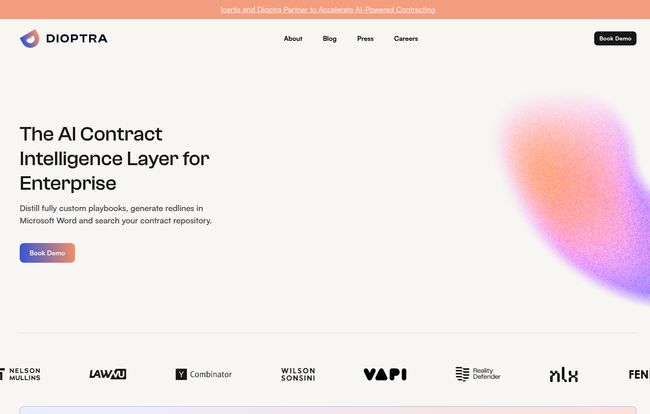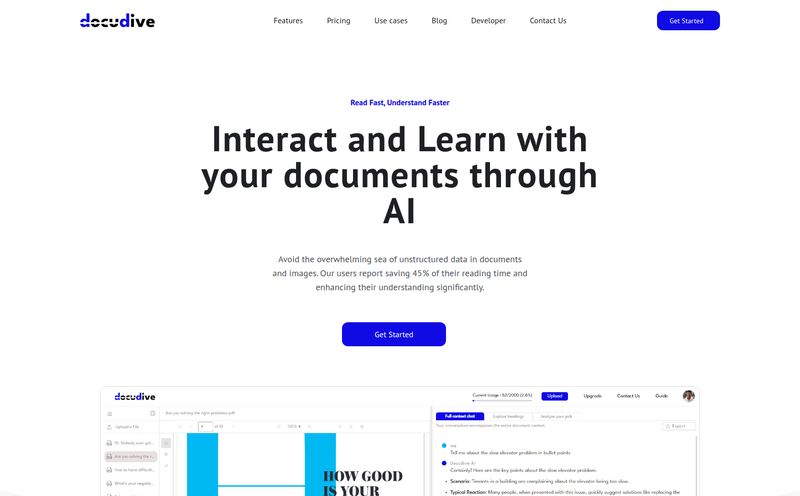If you’ve ever worked in or around a legal department, you know the drill. Contract review. It’s the corporate equivalent of eating your vegetables—you know it’s necessary, but good lord, can it be a slog. Hours spent poring over dense documents, eyes glazing over as you hunt for that one tricky clause, the endless back-and-forth of redlining... it's a special kind of painful intellectual labor.
For years, we’ve been promised AI would be our savior. A magical robot that would just handle it. Most of the time, the reality has been... well, underwhelming. Clunky software, inaccurate suggestions, and tools that create more work than they save. So when I stumbled upon Dioptra, which calls itself “The AI Contract Intelligence Layer for Enterprise,” my professional skepticism kicked in. But then I started digging. And what I found was genuinely interesting.
This isn’t just another glorified search function. It feels different. So, grab your coffee, and let's talk about whether Dioptra is actually the real deal or just more tech hype.
So What is Dioptra, Really?
At its heart, Dioptra is designed to be a lawyer's second brain. Imagine taking all the knowledge, experience, and negotiation history of your best lawyer and baking it into a piece of software. That's the vibe. It integrates directly into Microsoft Word and your existing contract repositories to help you analyze, draft, and negotiate agreements with a ridiculous amount of speed and precision.
It's not about replacing lawyers. Not at all. It’s about augmenting them. Think of it as the ultimate power-up, handling the tedious, repetitive parts of the job so the human experts can focus on high-level strategy and the stuff that actually requires a human brain. It’s a tool built for the trenches of corporate law.

Visit LLM Sandbox
The Features That Actually Matter
Any platform can throw a bunch of features on a landing page. But what really counts is whether they solve a real problem. Dioptra seems to have honed in on the biggest time-sinks in the contract lifecycle.
AI-Powered Redlining and Playbook Distillation
This is the one that made me sit up. Dioptra can automate redline generation based on your past negotiations. It learns your positions, your risk tolerance, and your preferred language from old agreements. It then codifies this into a living “Playbook.” So, instead of manually marking up a new vendor agreement for the hundredth time, the AI can do the first pass, flagging issues and suggesting changes that align with how you’ve handled it before. That’s a massive time-saver.
Search and Summarization on Steroids
Ever tried to find every instance of a specific indemnity clause across 500 active contracts? It’s a nightmare. Dioptra’s Term Search promises to do this at scale. But it goes further by generating Issues Lists & Risk Summaries. It's like having a searchlight in a blizzard of paperwork, pulling out the critical points so you can communicate risks to stakeholders without making them read the entire 80-page document. For in-house counsel, this is huge for streamlining communication with other business units.
Integrations and a Secure AI Chat
A tool is only as good as how well it fits into your day. Dioptra claims to integrate with existing workflows like CLMs and Docusign. This is smart. Nobody wants another siloed platform to log into. They also have a Secure AI Chat, which seems to be a nod to the fact that while ChatGPT is great for writing poems, you wouldn't dare paste sensitive contract data into it. Having a secure, purpose-built chat for legal queries is a must.
Let's Talk Numbers: Does It Actually Work?
Okay, the features sound great. But the proof is in the pudding, right? This is where Dioptra gets bold, putting some serious numbers on its homepage:
- +80% Time Saved on legal work
- 97% Issue Flagging Accuracy
- 95% Accuracy on your paper, 92% on counterparty paper
These aren't just vanity metrics; they’re claims of tangible business value. And they’re backed by some pretty powerful testimonials. One review mentioned a task that would have taken “2 hours of painful intellectual labor was done in 30 minutes!” I’ve been there. I’ve felt that pain. That quote resonates.
Even more telling is the quote from David Wang at Wilson Sonsini, a major player in the tech and legal world. He called it a “Sputnik moment.” You don’t throw phrases like that around lightly. When a top-tier firm gives that kind of praise, it suggests the tech is solving a very real, very expensive problem.
The Elephant in the Room: Enterprise-Grade Security
For any enterprise, but especially in the legal field, security and data privacy are non-negotiable. It’s the first question, the last question, and every question in between. A breach of contract data could be catastrophic. Dioptra seems to understand this better than most.
They’ve built their security posture around several key pillars. First, they use Private LLMs and offer a self-hosted deployment option, meaning your data doesn't have to leave your environment. They state clearly: No training on customer data. This is the single most important promise an AI company can make to an enterprise client. Your confidential information isn't being used to train a model for your competitors. They're also compliant with standards like SOC 2 Type II and GDPR, with all data encrypted both in transit and at rest. They didn't just bolt security on at the end; they built the entire platform on a foundation of it.
What’s the Catch? Pricing and Potential Downsides
So, what does this magical beast cost? I wish I could tell you. I went looking for the pricing page to get an idea... and was met with a 404 error. Whoops. A minor slip, perhaps, but a real-world one. You can see it for yourself here (or where it's supposed to be).
This almost certainly means Dioptra is on a classic enterprise sales model: “Contact us for a demo and a custom quote.” Don't expect a simple three-tiered monthly subscription. This will be a considered purchase, likely with a significant price tag aimed at mid-to-large-sized companies where the time savings can justify the cost. For a solo practitioner or a very small firm, it might be overkill.
The other potential downside? Any tool this powerful will likely have a learning curve. Getting the most out of the Playbook Distillation feature will require thoughtful setup and feeding it the right data. It’s not a magic wand you wave once. It's a powerful engine that needs a skilled driver.
FAQs about Dioptra
How does Dioptra really protect my confidential data?
They take a multi-layered approach. The biggest deal is their policy of NOT training their AI models on customer data. Plus, they offer self-hosting, which means the software can run within your own company's servers. This is the gold standard for data control.
Is the security truly enterprise-grade?
It certainly appears so. Achieving SOC 2 Type II compliance is a rigorous process that audits a company's systems and controls over time. This, combined with GDPR compliance and robust encryption (TLS 1.2 in transit, SSE-S3 at rest), checks all the boxes for a serious enterprise security posture.
What about audit logs?
The site mentions them. For any enterprise tool dealing with sensitive information, having detailed audit logs is critical for compliance and security investigations. Dioptra seems to have this covered, tracking access and changes within the system.
Can I trust their vendors and subcontractors?
This is a great question that their own FAQ section brings up. It shows they're thinking like their customers. They state they conduct security assessments on their own third-party vendors, ensuring the entire supply chain is secure. This is a sign of a mature security program.
The Final Verdict: Is Dioptra the Real Deal?
After going through everything, I have to say I'm impressed. I came in skeptical, as I always do, but Dioptra makes a compelling case. It’s not trying to be a general-purpose AI for everyone. It's a highly specialized, secure, and powerful tool designed to solve a very specific, very expensive set of problems for enterprise legal teams.
The combination of real-world time-saving features, impressive accuracy metrics, and a security architecture that seems almost paranoid (in a good way) is a winning formula. It’s a tool that understands its audience deeply.
So, is it the end of agonizing contract reviews? Maybe not the end, but it sure looks like the beginning of a much, much better way of doing them. For any company drowning in legal paperwork, Dioptra is absolutely worth a look. It might just be that Sputnik moment for your legal team.



